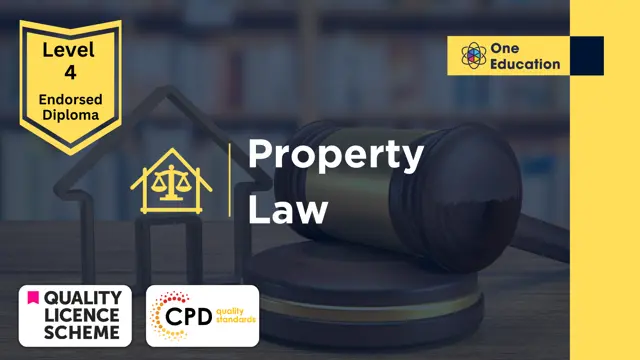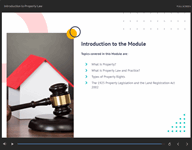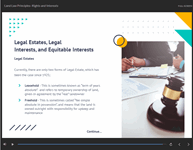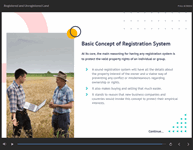
Property Law Level 4 QLS Endorsed
Level 4 Endorsed Advanced Certificate | CPD QS Certified | 120 CPD Points I Tutor Support | 24x7 Instant Access
One Education
Summary
- Certificate of completion - £9
- Certificate of completion - £89
- Exam(s) / assessment(s) is included in price
- Tutor is available to students
Add to basket or enquire
Overview
Property law is a legal field that deals with the ownership, use, and transfer of real and personal property. It includes a range of legal issues related to property, such as the rights and obligations of ownership, the creation and transfer of interests in property, and the regulation of property use.
There is high demand for property law expertise in a variety of settings, including government agencies, real estate firms, property development companies, and financial institutions. Property lawyers may also work in private practice, representing clients in disputes related to property ownership and use.
The career path for property law typically involves earning a law degree, passing the bar exam, and obtaining a license to practice law. Many property lawyers also choose to specialize in a particular area of property law, such as residential or commercial real estate, land use planning, or mortgage law.
This course provides an introduction to the principles of property law, including the different types of rights and interests that can be held in land and other property. It covers the laws related to registered and unregistered land, ownership and possession, co-ownership, leases and bailment, and licenses.
The course also covers the mortgage law, insurance, proprietary estoppel, and security interests. By the end of the course, students should have a strong understanding of the key concepts and principles of property law, and be well-prepared to pursue a career in this field.
Upon completion of this course, students will be able to:
- Explain the key principles and concepts of property law, including the different types of rights and interests that can be held in land and other property.
- Describe the laws related to registered and unregistered land, and understand the differences between them.
- Explain the laws related to ownership and possession of property, including the rights and obligations of ownership.
- Describe the principles of co-ownership and understand the different types of co-ownership arrangements.
- Explain the concepts of leases and bailment, and understand the rights and obligations of the parties involved.
- Describe the concept of a license and understand the difference between a lease and a license.
- Explain the laws related to mortgages, including the rights and obligations of the borrower and lender.
- Describe the role of insurance in property law, and understand the types of insurance that may be relevant to property ownership.
- Explain the concept of proprietary estoppel and understand how it can be used to protect property rights.
- Describe the concept of security interests and understand how they are used to secure debts or other obligations.
Expert Support
Dedicated tutor support and 24/7 customer support are available to all students with this premium quality course.
Key Benefits
- Learning materials of the Design course contain engaging voiceover and visual elements for your comfort.
- Get 24/7 access to all content for a full year.
- Each of our students gets full tutor support on weekdays (Monday to Friday)
Achievement
Certificates
Certificate of completion
Digital certificate - £9
Certificate of completion
Hard copy certificate - £89
QLS Endorsed Certificate
Hardcopy of this certificate of achievement endorsed by the Quality Licence Scheme can be ordered and received straight to your home by post, by paying —
- Within the UK: £89
- International: £89 + £10 (postal charge) = £99
CPD Quality Standards Accredited Certification
- Hardcopy Certificate (within the UK): £15
- Hardcopy Certificate (international): £15 + £10 (postal charge) = £25
CPD
Course media
Description
Courses Curriculum
Here is the curriculum breakdown of the course:
- Module 01. Introduction to Property Law
- Module 02. Land Law Principles- Rights and Interests
- Module 03. Registered and Unregistered Land
- Module 04. Ownership and Possession of the Property
- Module 05. Co-Ownership
- Module 06. Leases and Bailment
- Module 07. License
- Module 08. The Mortgage Law
- Module 09. Insurance
- Module 10. Proprietary Estoppel
- Module 11. Security Interests
Meet the Endorsement
The Quality Licence Scheme has been designed specifically to recognise high-quality courses. This Property Law course materials are recognised by Quality Licence Scheme (QLS). This ensures the deep research and quality resource allocation behind the development phase of the course. In addition, the QLS certificate enriches your CV and recognises your quality study on the relevant subject.
Meet the Accreditation
The CPD Quality Standards (CPD QS) assures the Property Law course training and learning activities are relevant, reliable, and upto date.
Course Assessment
To simplify the procedure of evaluation and accreditation for learners, we provide an automated assessment system. Upon completion of an online module, you will immediately be given access to a specifically crafted MCQ test. The results will be evaluated instantly, and the score will be displayed for your perusal. For each test, the pass mark will be set to 60%.
When all tests have been successfully passed, you will be able to order a certificate endorsed by the Quality Licence Scheme.
Who is this course for?
This property law course is designed for anyone who is interested in learning about the principles and concepts of property law. It may be particularly useful for:
- Students who are studying law and want to learn more about property law as part of their legal education.
- Professionals who work in fields related to property, such as real estate, property development, or finance, and want to gain a deeper understanding of the legal principles that apply to their work.
- Entrepreneurs or business owners who want to learn more about property law as it relates to their business interests, such as leasing or purchasing property for a business.
- Members of the general public who are interested in learning more about property law and how it affects their rights and obligations as property owners.
Requirements
This Property Law course is open to all, with no formal entry requirements.
Career path
By the end of this course, learners will be able to take the steps towards starting a new career. Here are a few career options they can opt for:
- Property Lawyer - £20,000 to £45,000
- Licensed Conveyancer - £20,000 to £45,000
- Estate Agent - £19,000 to £40,000
- Letting Agent - £16,000 to £30,000
Questions and answers
I am interested in becoming a conveyancer and wanted to know if this course was the place to start as I have no previous experience Thanks
Answer:Dear Lynn, Thank you for your question. There is no experience or previous qualifications required for enrolment on this course. It is available to all students of all academic backgrounds. We believe that this course will enhance your skills on the topic and you can apply for a job in the relevant field after completing the course. Thank you.
This was helpful.
Reviews
Legal information
This course is advertised on Reed.co.uk by the Course Provider, whose terms and conditions apply. Purchases are made directly from the Course Provider, and as such, content and materials are supplied by the Course Provider directly. Reed is acting as agent and not reseller in relation to this course. Reed's only responsibility is to facilitate your payment for the course. It is your responsibility to review and agree to the Course Provider's terms and conditions and satisfy yourself as to the suitability of the course you intend to purchase. Reed will not have any responsibility for the content of the course and/or associated materials.








